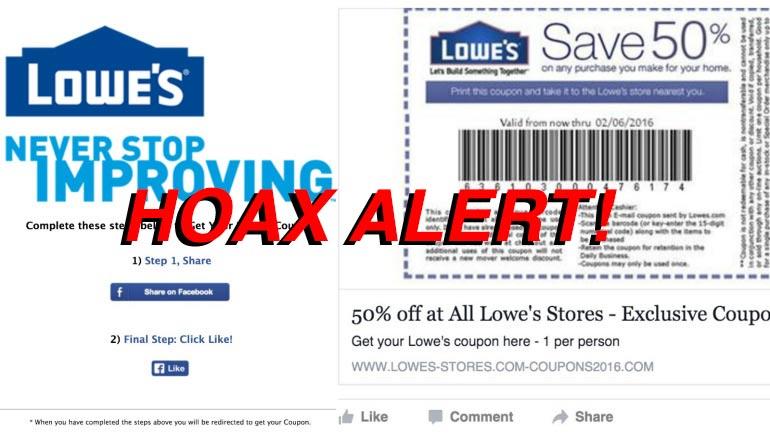Best buy 50 off coupon hoax
Contents:
That coupon is percent fake, but this hasn't stopped thousands of people from sharing it on Facebook.

There are a couple of reasons to care about fake coupons. First, the linked coupons you see on Facebook Timelines and Twitter feeds aren't coupons -- not even fake ones. They're just bait images that, when clicked on, will either a install malware on your device, b spam all of your friends' pages with fake coupon ads, c ask you to fill out at least surveys and sign up for 16 services you don't want in order to finally get the coupon which you will never get , or d all of the above.
Second, if you actually do end up with a fake coupon in hand, you take it to a store, and the store accepts it as real, the store loses money. This doesn't make a huge difference in your life except for the sweet deal you just got thanks to that cashier's blissful ignorance , but if enough fake coupons are accepted as real, the store will eventually decide that it makes more sense to just stop accepting coupons altogether.
So, no more sweet deals, real or fake, for you.
- Walmart's Black Friday Ad Has A Nasty Expensive Surprise.
- black friday deals tv uk 2019.
- Stores warn customers enticing Facebook coupons are a scam.
- tigerdirect free shipping coupon?
- urban ladder coupon code?
- drs on demand coupon.
- sport deals uk!
So, lose-lose situation either way. If you're not sure if that coupon you see on your friend's wall is fake, here are some signs that it may be:. Most of the fake coupons you're going to see this holiday season will come from a source close to your heart -- one of your Facebook friends!
How you can spot fake coupons on Facebook -- and why it matters.
If you see a fabulous Walmart deal pop up in your friend's feed, roll over it right quick -- where does the link go you should be able to see the full URL in the lower corner of your browser. Does it lead to Walmart. Or does it lead to free-holiday-walmart-target-coupons-for-real. If the coupon you're looking at is on this list, it's definitely fake. But if it's not on this list, it could still be fake -- do a quick Google search to see if it comes up on any fraud alert sites or in any news stories.
Walmart's Black Friday 2018 Ad Has A Nasty Expensive Surprise
For example, all you have to do is Google "Target coupon" and a bunch of news stories will pop up about how that 50 percent off Target coupon is fake. Look at the coupon. Has it been altered in any way?
Does the coupon look like a real coupon? Is there a bar code?
How Can You Tell If That Coupon Is a Scam?
Instead, customers are told to visit ShopRite. Please know that ALDI does not issue electronic coupons. We sincerely regret any inconvenience this situation may cause.
The Federal Trade Commission does have rules about false, misleading and deceptive advertising. While none of these signs are definitive proof that a coupon isn't legitimate, remember that retailers typically take the time to make their advertising and coupons look good. The language just sounds wrong for the brand. No legitimate company will ask for personal information in exchange for a coupon. While you may think there's no harm in a fake coupon — other than not getting the deal you were hoping for — coupon scams can steal your personal information or infect your computer with a virus. When I called them to help with the order they told me that the coupon code was not valid and removed it off of their site. Published August 8,
Scammers can also make links look like they lead to legitimate websites and emails appear to come from a different sender. Legitimate businesses do not ask for credit card numbers or banking information on customer surveys.
Can the Queen Legally Kill President Trump with a Sword?
When in doubt, do a quick web search. If the survey is a scam, you may find alerts or complaints from other consumers. If the survey is real, you may be entered in a drawing to win a gift card or receive a small discount off your next purchase.
- Off Target!
- Black Friday/Cyber Monday?
- Stores warn customers enticing Facebook coupons are a scam | WPMT FOX43;
- 5 signs that awesome coupon is probably fake - CNET.
This is an archived article and the information in the article may be outdated. Please look at the time stamp on the story to see when it was last updated.